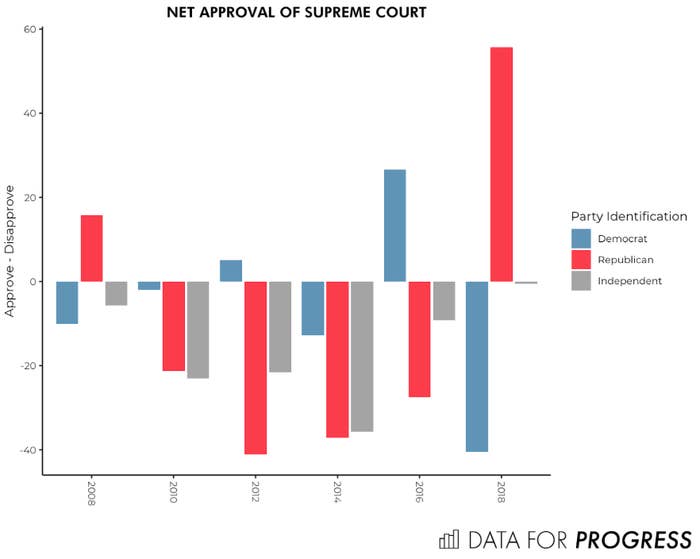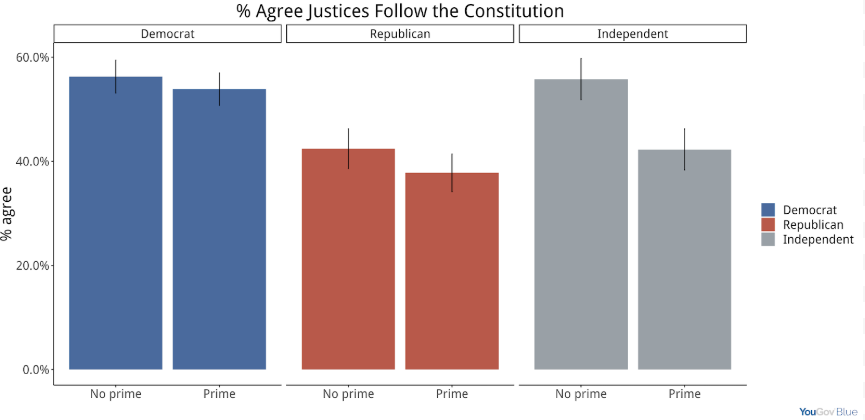
Brett Kavanaugh changed perceptions of the Supreme Court for good. Now, the court’s right-wing majority is preparing to make one of its most partisan decisions in recent memory: approving an explicit attempt to benefit the Republican Party by adding a citizenship question to the census. The ruling will come with the court in a precarious position; after decades of solid support from Democrats, the court is now seen in strongly partisan terms, survey data shows.
Democrats long remained relatively supportive of the court, despite its history of opposing progressive goals, as I wrote last year. Now, thanks to research conducted with progressive organization Take Back the Court, we have evidence that progressives are putting meaningful pressure on the court, and that presidential candidates who urge judicial reform should continue to make their case aggressively.
Data for Progress analyzed the 2018 Cooperative Congressional Election Studies (CCES) survey, which has asked about approval of the Supreme Court since 2008. In 2016, 56% of Democrats approved of the court and 30% disapproved. By 2018, in a stunning reversal, 23% of Democrats approved and 63% disapproved. Republicans had the reverse flip, from a decade of disapproval to strong support.

CCES has also asked respondents to describe the perceived ideology of the court. In the 2016 survey, 37% of Democrats saw the court as conservative, compared with 64% in 2018. Among independents, 22% saw the court as conservative in 2016, rising to 47% in 2018.

Much of this is due to disdain for Kavanaugh, who consistently has the lowest favorability ratings of any Supreme Court justice. The CCES asked respondents whether they would have voted to confirm both Neil Gorsuch and Kavanaugh. Respondents were evenly split evenly in favor of Gorsuch, while they opposed appointing Kavanaugh 54% to 46%, with 59% of women opposed.
In research we conducted with YouGov Blue, we included a very partisan cue in a study on court opinion. In one condition, we simply displayed the names of justices; in another, we also told respondents the name of the president who appointed them. This led to significant changes in attitudes — and importantly, a rise in the perceptions of judges as fundamentally partisan actors motivated by political views and not the law.
When primed simply by knowing the party of the appointing president, 53% of respondents agreed that “the current Supreme Court mostly decides cases on the Justices' political preferences, rather than on the Constitutional merits of the case.” Without knowing the party, 53% agreed cases are mostly decided on their constitutional merits — a net shift of six points.
Independents were most affected by the partisan knowledge. The results show how progressive messages can change public perception of the court.

Such messaging would, of course, be greatly assisted by nakedly partisan rulings that work primarily to benefit Republicans rather than faithfully interpret the Constitution. Conservatives on the court are aware of this risk, and Chief Justice John Roberts reportedly took it into account when striking a compromise deal to save part of Obamacare from total nullification by the judges.
But all bets are off in the Trump era, and the census decision — which experts say will lead to noncitizens being underrepresented, punishing Democratic-leaning states in the electoral system — looms large. The partisanship of the deliberations is hard to avoid: As the New York Times noted, after decades of insisting that courts should ignore international examples, Justice Gorsuch happily cited international precedents when they aligned with his partisan interests on the census case.
The ruling could accelerate the changing opinion of the court, and be particularly effective in building support for an idea that has been floated in progressive circles: appointing additional justices to counter the current conservative majority that was installed in dubious circumstances.
There is still not majority support for court expansion, but our research showed messaging can move the needle. In our most recent survey, we tested various messages for their level of support. The message that received the most support was:
The Supreme Court is composed of nine people, all of whom were educated in the Ivy League. At least one has served as a political lobbyist, most of them have worked in partisan politics, and many take paid speaking engagements from ideological groups like the Heritage Foundation and Planned Parenthood. It is time to look past the Supreme Court as an institution and look at it as a group of nine people with political biases. Expanding the Court will ensure that the people on that Court conform to the political standards of our time.
In a scenario where respondents saw no such message, 24% supported court expansion, 32% had no preference or were unsure, and 44% opposed (net -20).
But when presented with our preferred message, 34% supported expansion, 29% had no preference, and 37% opposed (net -3), a 17-point net improvement.
Other research suggests support may be even higher. Recent Navigator polling found that 56% of respondents — including 82% of Democrats and 54% of independents — were more convinced by an argument that the court has been politicized and “we need to add more justices and create a less political process” versus one that said court expansion “is just an attempt by radical Democrats to ‘pack the Courts.’”
The progressive blitz is working as intended. Activism around Kavanaugh has durably affected Democratic views of the court, and there are now paths to court expansion with positive support. Eric Holder has expressed openness to the idea, as have several progressive presidential candidates. If Chief Justice Roberts doesn’t already feel the heat over the census question, he should. The more the court proves itself to be a nakedly partisan institution, the most voters will support efforts to reform it.
Sean McElwee is the cofounder of Data for Progress and the director of research and polling for Take Back the Court.
